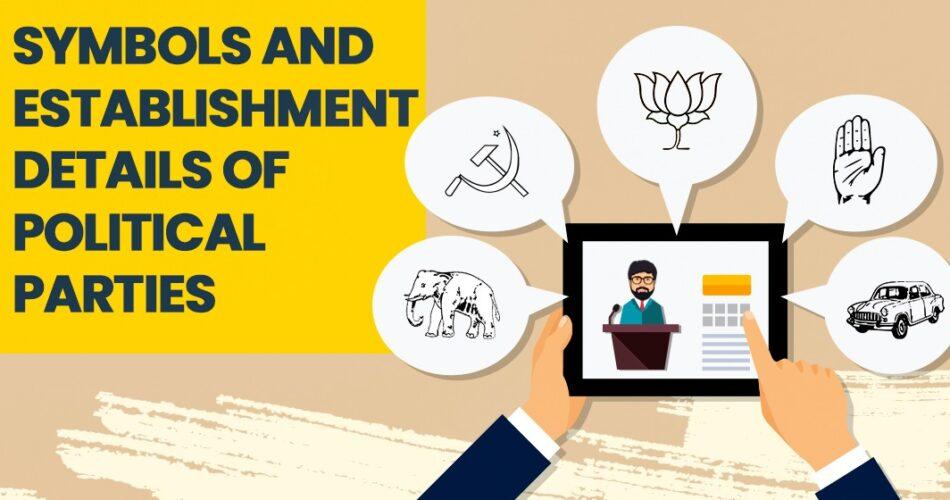Discover the significance of political party symbols in Indian Politics and how they impact elections. Learn how agencies like Political Engineer can help parties establish a strong social media presence to increase their chances of winning.
Politics is an essential aspect of any Democratic Country. In a Democracy, citizens have the right to vote for their chosen candidates and, in turn, choose the government that will govern the country. Political Parties play a crucial role in this process. They represent the interests of different sections of society and compete to win elections. Political Parties are identified by their symbols, which are registered with the Election Commission of India. Here, we will explore the establishment details of political parties and their symbols.
Establishment Details
Political parties in India are registered with the Election Commission of India (ECI) under the Representation of the People Act, 1951. The ECI is an independent constitutional body responsible for conducting free and fair elections in the country. It oversees the registration of political parties, the conduct of elections, and the implementation of the Model Code of Conduct during elections.
To register a political party in India, the party must submit an application to the ECI. The application must include a copy of the party’s constitution, a list of its office bearers, and details of its sources of funding. The ECI scrutinises the application and, if satisfied, registers the party. Once registered, the party is allotted a unique symbol that is used on ballot papers during elections.
Political Parties Symbols
The use of symbols by political parties in India has a rich history that dates back to pre-independence times. In the early days of Indian Politics, symbols were used by nationalist leaders to rally support for the freedom movement. Even after independence, symbols continued to play an important role in Indian Politics.
As mentioned earlier, the allocation of symbols to political parties is done on a first-come, first-served basis by the ECI. However, there are some rules and regulations that govern the allocation of symbols. For instance, some symbols are reserved for national parties, while others are reserved for state parties. National Parties are those that have a presence in at least four states and have won a certain number of seats in Lok Sabha or State Assembly Elections.
The ECI also has the power to withdraw symbols from political parties in case of a violation of the Model Code of Conduct or any other electoral malpractice. This is done to ensure free and fair elections and to prevent any undue advantage being given to any political party.
The use of symbols has also led to some interesting developments in Indian Politics. For instance, some political parties have adopted symbols that have become iconic over time. The Bharatiya Janata Party uses the “lotus”, which is associated with the party’s ideology of prosperity and eternity. The Samajwadi Party uses the “Cycle” symbol, which has become synonymous with the party. The Bahujan Samaj Party uses the “Elephant” symbol, which is seen as a symbol of strength and stability.
Impact of Social Media on Symbols
Social Media has transformed the way political parties engage with voters, unleashing a tidal wave of influence on Indian Politics. In a world where every party is trying to capture the attention of their supporters, symbols have become a vital tool for parties to showcase their identity on Social Media Platforms like Twitter, Facebook, and Instagram.
Parties are using symbols in a plethora of ways on Social Media – as profile pictures, cover photos, and graphic elements in their posts. This creates a visual identity for their campaigns and helps voters recognize and remember their symbol. In a political arena as cluttered as India, where multiple parties compete for voters’ attention, symbols play a critical role in establishing a party’s brand identity.
Furthermore, social media has allowed parties to personalise their messaging and target specific voter segments using their symbols. For instance, parties can use symbols that appeal to young voters, creating social media posts and graphics tailored to this demographic. This enables parties to reach out to hard-to-reach voters more easily and customise their message according to specific demographics.
However, it’s not all sunshine and roses for political party symbols on social media. Social Media has also intensified competition among political parties, resulting in symbols being used as weapons to incite polarisation and communal unrest. Parties may use symbols to appeal to certain religious or caste groups, further dividing the electorate.
Conclusion
In essence, we at Political Engineer firmly believe that symbols and registration details are indispensable for political parties to participate in elections in India. As a trusted partner, the Election Commission of India plays a critical role in helping parties register and choose symbols that accurately represent their brand. The use of symbols in politics has a rich history, and in today’s digital age, they have become even more vital. Social Media has allowed parties to connect with voters using symbols, especially the youth who are more active on these platforms.
At the same time, we are aware that symbols can be misused to incite polarisation and communal tension, which is unacceptable. However, by working closely with our clients, we can help them use their political party symbols effectively to establish a strong social media presence and increase their chances of winning elections. With our modern digital strategies and expertise, we help political parties harness the power of symbols in a responsible and ethical manner.
At Political Engineer, we remain committed to empowering political parties with the tools and knowledge they need to use symbols effectively, while upholding the values of democracy and inclusivity. So, if you also want your party’s symbol to reach every mobile phone screen by means of social media, Contact us today.

Follow us for more updates on LinkedIn
Get more interesting stuff on our official portal. Visit us on:
https://www.politicalengineer.in

